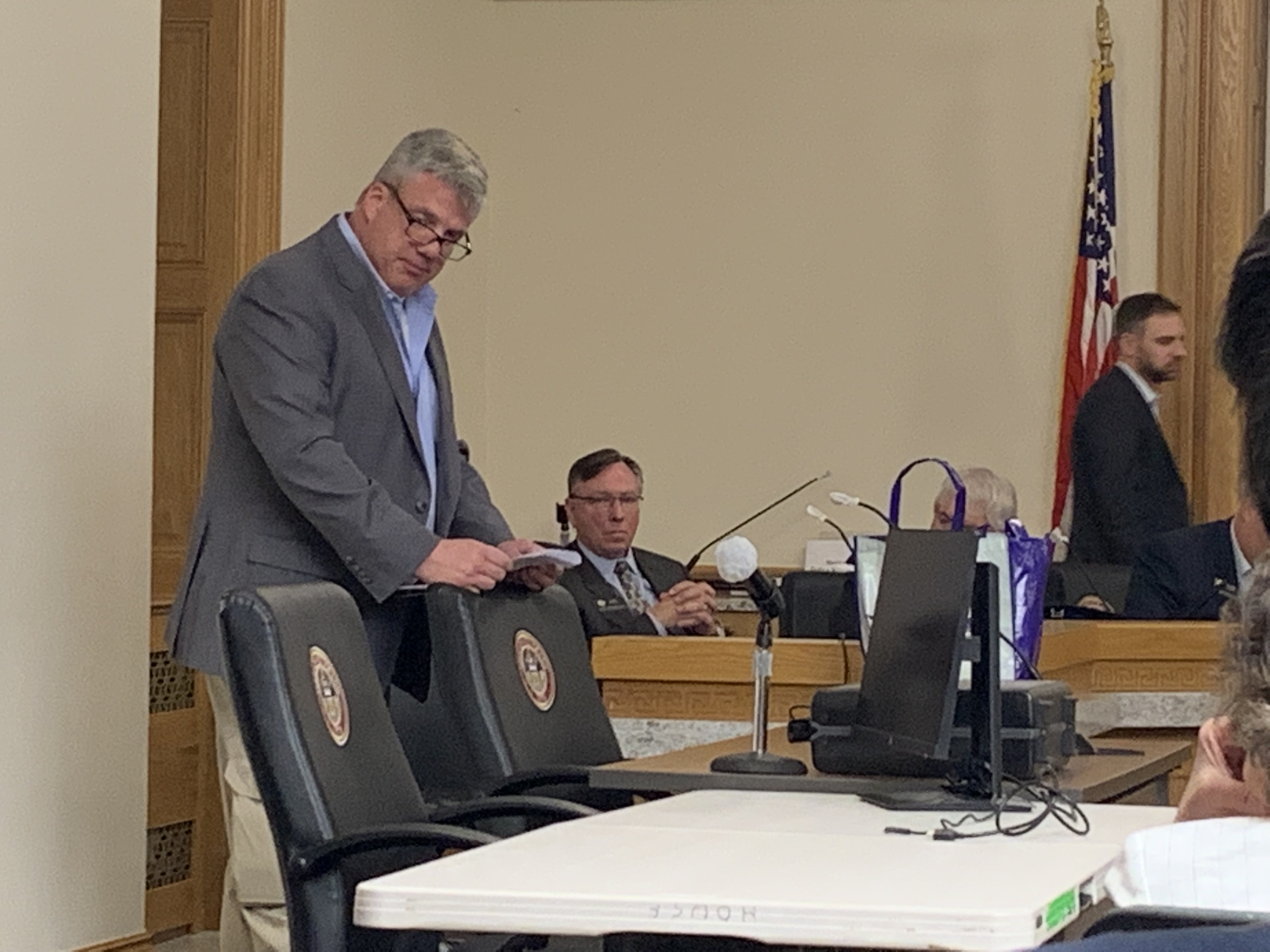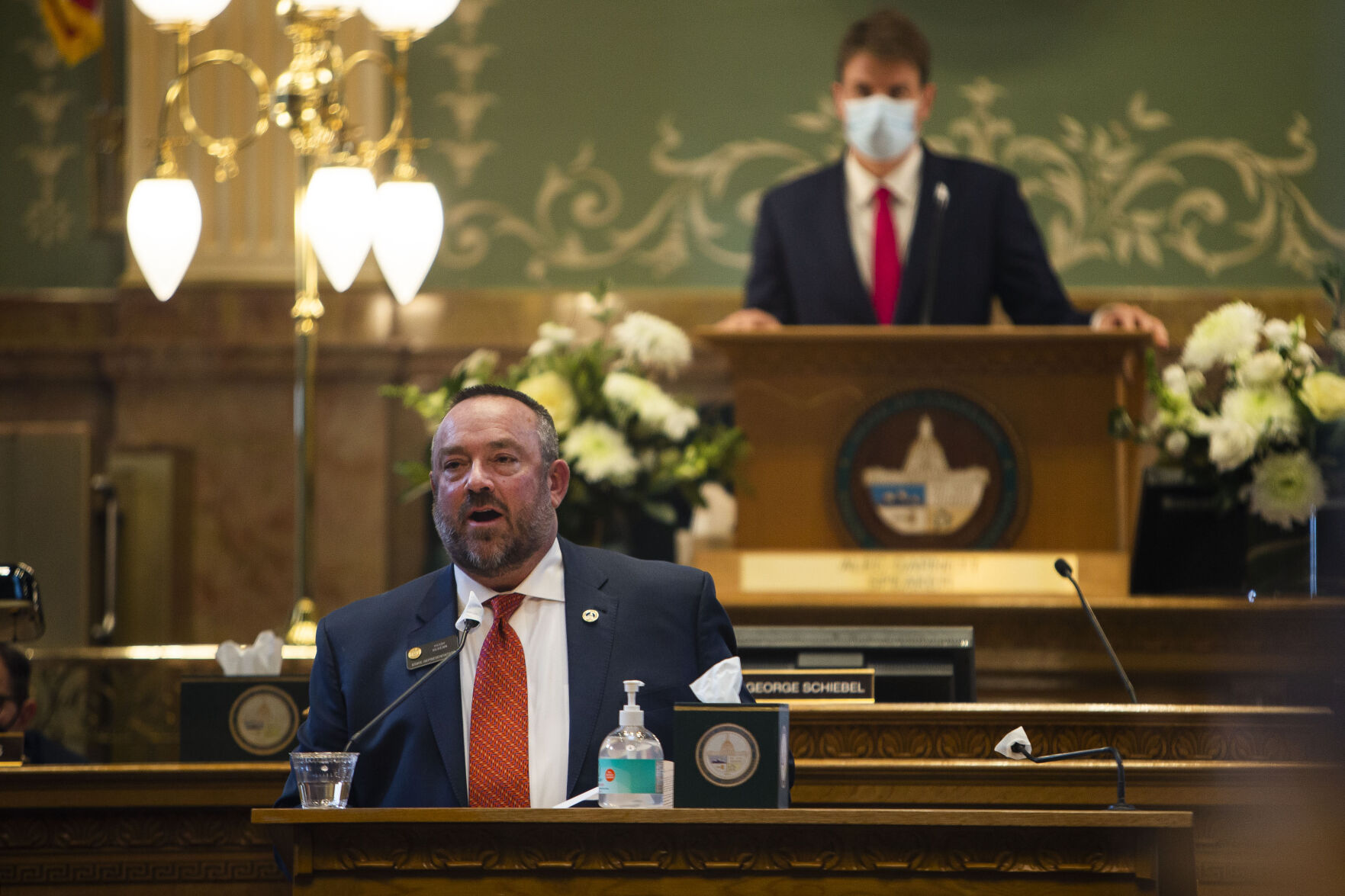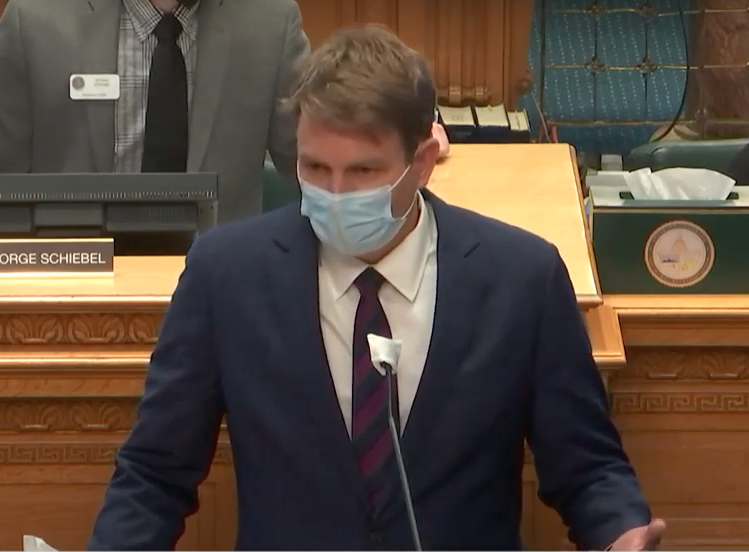Colorado state Republicans say Jan. 6 protesters who didn’t storm U.S. Capitol should be commended, not vilified

In a move that restoked the controversy over the 2020 election results and the attack on the U.S. Capitol, Republicans on Tuesday pushed – and Democrats rejected – language thanking those who protested at the Capitol on Jan. 6 last year.
Rep. Dave Williams, who sponsored the language, sought to differentiate those who stormed the U.S. Capitol and those who didn’t, saying the latter exercised their First Amendment rights and should be commended instead of vilified.
“I’ve heard many people disparage Americans and taxpayers who have very legitimate concerns about what happened in the 2020 election, and they’re brushed aside. They’re brushed off. They are called conspiracy theories or they are labeled tinfoil-hat conspiracy theories. That’s unacceptable. We serve these people. We represent them. They’re the boss,” said the Colorado Springs Republican, who is challenging U.S. Rep. Doug Lamborn in the GOP primary for Colorado’s 5th Congressional District.
“It’s only appropriate that we all could agree that those who didn’t break the law, those who acted honorably, we should thank them even if we disagreed with them,” he added.

Williams’ amendment specifically identified Rep. Ron Hanks, R-Cañon City, thanking him and “the millions of other Americans who joined him on January 6, 2021, to exercise their unalienable rights, as enshrined in the First Amendment to the United States Constitution, to speak, peacefully assemble, and seek redress from their government in order to secure our elections and protect the sacred right of every lawful vote to be counted.”
Williams told his colleagues he has heard “terrible things” being said about Hanks and how “he’s an insurrectionist.”
“That’s a bold-faced lie,” he said.
Hanks has been at the center of controversy at the statehouse after he joined thousands of then-President Donald Trump’s supporters at a rally the same day Congress met to certify Joe Biden’s election. The lawmaker’s presence at the rally sparked an unsuccessful attempt by a Democrat to expel him from the legislature.
He also joined dozens of state lawmakers from around the country last year in signing onto a letter calling to throw out the results of the 2020 presidential election if enough states can’t pass a review modeled on the audit ordered by the leaders of the Arizona state Senate.
That audit of Maricopa County’s votes confirmed Biden’s victory in that state. But those who conducted it raised objections, and supporters insisted enough of the votes they questioned could overcome Biden’s lead.
The claims of election fraud have failed to withstand scrutiny. The Associated Press reported in December that out of more than 25 million votes cast in six battle ground states in 2020 – not including Colorado – there were fewer than 500 cases of voter fraud, far too few to influence the outcome. An exhaustive AP investigation also found that the allegedly fraudulent votes were more likely to have been cast by Trump supporters worried that the other side was cheating.
Williams offered the language via an amendment during a debate over a Democrat-backed resolution urging Congress to pass comprehensive voting rights legislation to counteract actions by several states members of the majority party believe have made it more difficult for voters to cast a ballot.
The underlying resolution – Senate Memorial 1 and House Resolution 4 – argued for the passage of Freedom To Vote Act and the John Lewis Voting Rights Advancement Act, and also reasserts the “validity of the 2020 presidential election results as legitimate and verified.”
In the Senate, Democrats evoking apartheid-era voting restrictions and warned of a dire end for America’s democracy if, they said, Congress doesn’t intervene to effectively undo laws they characterized as diminishing people’s ability to exercise their right to vote.
In the House, Republicans countered with a series of amendments, which all failed. They included language aimed at preventing dead people and non-citizens from voting, provisions Democrats noted are already in state law.
Another amendment called into question “the legitimacy” of Biden’s presidency; encouraged states to conduct their own audits; and, urged the “decertification of election results in states where election fraud is uncovered that would be sufficient to have changed the election outcome while standing with the 45th President of the United States, Donald J. Trump, in his righteous efforts to fight for election integrity.”
The same amendment offered support to Mesa County Clerk and Recorder Tina Peters, who “upheld her oath of office by preserving election records and now faces unjust persecution and prosecution” from Democratic officials.” Secretary of State Jena Griswold on Tuesday filed another lawsuit against Peters, this time in an effort to keep the embattled clerk from overseeing the 2022 elections.
While it highlighted divisions between Biden and Trump supporters, Williams’ amendment also demonstrated the sensitivity with which Republicans approach the 2020 elections, and it confirmed intra-party divisions over how to view the events of Jan. 6, 2021.
The amendment received the backing of 15 his party mates, but House Minority Leader Hugh McKean wasn’t among them.
McKean, in fact, advocated for the amendment’s defeat – albeit for technical reasons.
The amendment contained two parts – the talked about Jan. 6 and second point sought to ensure that dead people are removed from the voter rolls and that those who are unlawfully present in the U.S. cannot vote in Colorado’s elections.
McKean tried to split the two points.
“I would suggest that this motion is flawed in the fact that we are trying to discuss two very different things in the same passage,” he said.
The Democrats’ resolution, which ultimately prevailed, took aim at restrictive voting laws adopted in Georgia and Texas, cited the Jan. 6 riot, and said “falsehoods and conspiracies regarding the integrity of the 2020 election have run rampant in our media and public discourse.”
It concluded by calling “on the United States Congress, and specifically members of the United States Senate, to pass comprehensive voting rights legislation to protect the fundamental right to vote, which has been the cornerstone of our democracy since the founding of our republic.”

Hanks’ views on the 2020 elections, a centerpiece of his U.S. Senate campaign, were on full display on Tuesday.
After praising King and civil rights leaders from the 1960s, Hanks dove into “election integrity.” That featured a defense of people who, like Hanks, were in Washington, D.C. for the Jan. 6 riot but did not participate in the violent attack on the U.S. Capitol.
“I am a little offended for some of the people I met in Washington, D.C.,” Hanks said. “These people did nothing wrong. They were afraid for their country.”
McKean, in his final comments, acknowledged that President Joe Biden won the election in 2020, just as President Donald Trump won in 2016.
The debate so vexed House Speaker Alec Garnett, who shouted, “In Colorado we cannot remain silent!”
He added: “The choice is clear between the two groups of elected representatives in this building. You have a choice. Your ability to vote is under threat.”
As he held up one of Republican amendments, the speaker said, “In these words … America, listen up. Your ability to vote is under threat! Pull the records and look at who voted for those amendments!”
Reporter Marianne Goodland and Digital Editor Pat Poblete contributed in this article.















